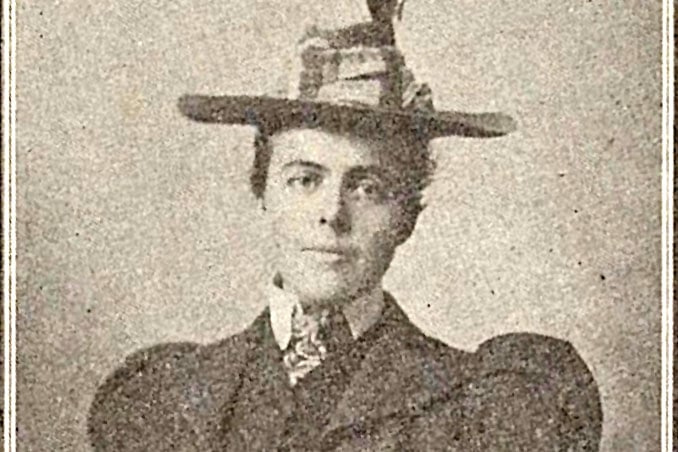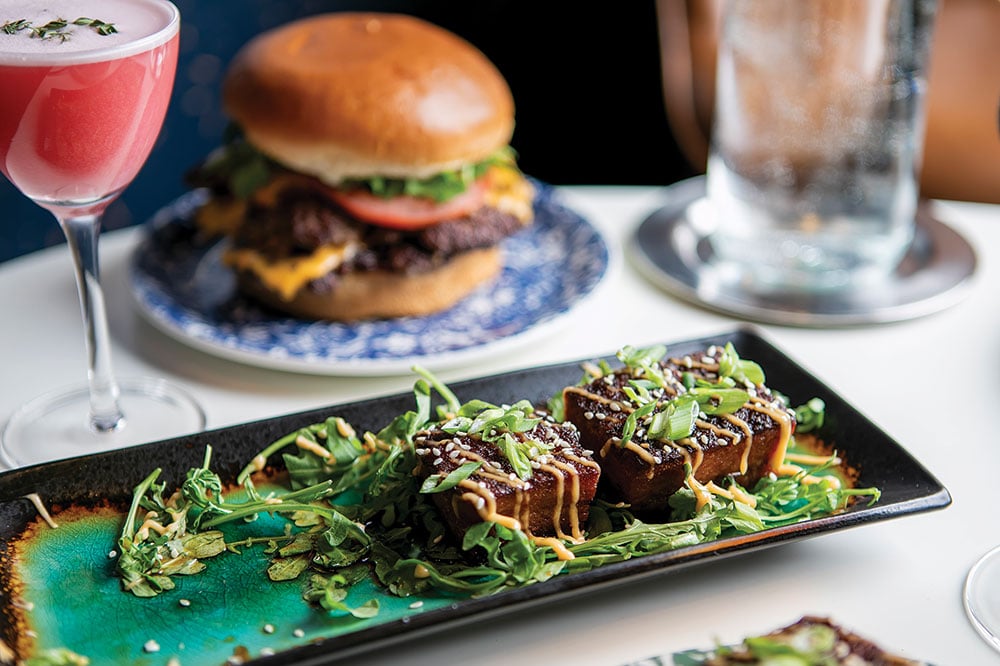Restoring Their Voices: Pittsburgh’s Vital Sanctuary for Exiled Writers
A year after the horrific attack on Salman Rushdie, the work of Pittsburgh’s City of Asylum is needed more than ever.
 Sampsonia Way is a one-way alley on the North Side, barely wide enough for a car to drive down. But on one short block, exiled writers from around the world have found space to exhale.
Sampsonia Way is a one-way alley on the North Side, barely wide enough for a car to drive down. But on one short block, exiled writers from around the world have found space to exhale.
After being silenced or tortured for speaking their minds, their creativity bubbles up in exuberant ways — Chinese calligraphy painted on a rowhouse, jazz and poetry ringing through the street, an anonymous Sudanese writer putting her name on a book.
This is City of Asylum, the sanctuary for exiled writers. Over the past two decades, Diane Samuels, an artist, and her husband Henry Reese, a former telemarketing entrepreneur, have given refuge to 18 voices from around the world as well as short-term writers and artists. They have also created a community of people in Pittsburgh who have stepped up to give the writers back their voices.
Dr. David Solosko learned about the plight of persecuted writers in 2005 when he moved around the block from Sampsonia Way. Neighbors packed into the alley each year for an open-air jazz and poetry celebration. “We were amazed how it brought a huge number of diverse people together,” says Sokosko, a big supporter of the nonprofit. “It was a festival.”
Solosko also witnessed the power of communal support when City of Asylum survived one of its darkest days.
On Aug. 12, 2022, Reese was sitting on the Chautauqua Institution stage in western New York next to Salman Rushdie, one of the most famous exiled writers in the world. The promised intellectual talk about City of Asylum devolved into a chaotic crime scene when a young man jumped the stage, stabbing Rushdie repeatedly and wounding Reese above his right eye.
“The amazing thing is that the instant the attack occurred, there were literally dozens of people from the audience who rushed the stage to help subdue this guy,” says Solosko, a retired anesthesiologist who was sitting in the front row. “I still think about that.”
Solosko was one of those who ran to the stage, where he tended to Reese’s wounds as others helped Rushdie. He was in awe of Reese, who reacted to the assailant by putting himself in harm’s way to protect the famous author.
“Henry was magnificent. Henry leapt up and ran over and started to pull the attacker off of Rushdie and probably saved his life.”
Solosko’s wife, Sandy Kniess, a retired nurse and former City of Asylum board member, still marvels at Reese’s reaction. “Here is this man in his 70s, and he jumped, without hesitation, into a knife fight” — against a 24-year-old accused attacker, no less.
Reese, 74, doesn’t want to talk about his heroics that day. Instead he stresses the audience reaction and their fierce protectiveness of writers who live under the weight of persecution.
“You would expect people to run away, but they ran forward,” Reese says. “It’s a metaphor, the physical embodiment” of what the City of Asylum community stands for.
Rather than spooking them, the attack has given Reese and Samuels a renewed sense of urgency to protect writers and free speech.
“We were driven before but are even more driven now,” says Samuels, also 74. “It gave us more of a sense of what writers go through, seeing the horrendous proof of what happened to Salman Rushdie. Thank God he survived.”
Roots of Inspiration
In some ways, the attack was a full-circle moment, the second time that an intersection with Rushdie had a profound effect on the couple’s lives.
Back in 1997, Samuels and Reese went to see Rushdie, one of their favorite authors, at a lecture in Oakland. Living with a death threat on his back, the author of “The Satanic Verses” told the audience he was lucky to have found protection and support in London. Too many other persecuted writers from around the world still needed safe houses.
Samuels walked out thinking about the rental property she owned. “I was the worst landlord in the world,” she says, at least when it came to making money. A soft touch, she would let it slide if a tenant couldn’t pay their rent. After hearing Rushdie’s story, she thought a better use for the house would be as a residence for a writer in peril.
Samuels and Reese, who were in their late 40s at the time, say they were in the position to help. “We didn’t have children — we didn’t have to pay for college,” Samuels says.
Instead of setting up an independent organization, the couple sought the guidance of the International Parliament of Writers, which started a worldwide network of Cities of Asylum in Europe in 1995. Reese spent six years emailing the organization and hearing only crickets. Nothing if not tenacious, he kept at it until he finally got an answer in 2003 that the organization was in the process of setting up a U.S. chapter. City of Asylum Pittsburgh opened the next year.
The first exiled writer to arrive in Pittsburgh was Huang Xiang, a revolutionary poet from China who was tortured and imprisoned seven times after speaking out against China’s communist regime. Upon arrival, he told Samuels he wanted to carve his poetry on Mount Washington to express his gratitude to Pittsburgh.
Samuels didn’t quite have the clout to pull off that grand gesture, but she offered him the next best thing — the front of the house where he was staying on Sampsonia Way. He painted white calligraphy on the brown exterior, and then the man who didn’t speak any English attracted a crowd with his street performances, his arms gesturing, throwing himself down, his hair sweeping the ground. “I am a wild beast hunted down,” he called out in Chinese, the first line of his poem “Wild Beast,” which was on the house.
Aleksei Kaminski grew up on the same block of Sampsonia. When he was in elementary school he remembers walking out of house many mornings on this way to school and seeing Xiang up on scaffolding, painting Chinese letters on the house. He often heard Xiang giving his performative readings on the street. Over time, Xiang would kick off the start of the City of Asylum’s now-annual jazz poetry festivals with his readings.
Despite the language barrier, the poet with a warm manner “brought the whole neighborhood together,” says Kaminski, 25, who now lives in Chicago and does marketing and community engagement work at the Institute for Justice Clinic on Entrepreneurship, a nonprofit public interest law firm.
As he grew up, Kaminski met other writers. “It gave me access to the world in 828 feet,” he says, referring to the block of alleyway — the distance between Monterey Street and Sherman in the Mexican War Streets neighborhood
Xiang’s exuberant street performances also drew people from across town. Dentist Owen Cantor had no idea what he was watching when he arrived to see Xiang. “It was almost like a folk dance,” he says. “He was painting the floor with his hair. It was amazing.”
But when Reese explained about City of Asylum and how the writers needed doctors, Cantor volunteered his dental services to Xiang, whose teeth had been knocked out during his imprisonment. The injuries stifled his ability to shout out his poems on the street. Cantor spent about two years reconstructing his mouth, and when he finished, Xiang was so ecstatic he hopped around the office in joy. Cantor also has given dental care to other writers.
Other people have donated medical care and legal services related to immigration. The program also provides a living stipend and health insurance.
The program grew as the couple kept buying houses on the same little block, seven in all, and renovating them on their own dime. Now seven writers at a time can stay there rent-free for as long as needed. Some have stayed for as long as seven years. The nonprofit City of Asylum operates on a $1.5 million annual budget.
For the first 13 years, Samuels and Reese would often host the readings and events in their home — a big change for the couple who had little entertaining experience. The soft-spoken Samuels was a little wary at first. What about her privacy?
“At one point, I asked myself, ‘What am I so worried about — that someone is going to open my underwear drawer?’ The people have been great. Our world has gotten so much larger.”
A Mark on Pittsburgh
The writers have left their mark on Sampsonia Way, a tourist attraction and polyglot explosion of technicolor resistance poetry and murals. Down from the Chinese poetry house is the Pittsburgh-Burma House, where text by Khet Mar accompanies her husband Than Htay Maung’s vibrant mural of the Pittsburgh skyline as she imagined it while still surrounded by suffering back in Burma. Then there is the Comma House, with a comma-shaped poem by Bangladeshi writer Tuhin Das, set against an orange and green exterior — the colors of the Bangladeshi flag.
Chris Gribble, former chair of the International Cities of Refuge Network, praises what Samuels and Reese have accomplished as unique among about 80-member organizations of the network. “There is no other set-up like it in the world, I believe, in that it owns properties, public spaces and drives a community program based on a fundamental commitment to freedom of expression and to protecting the writers and artists who are the ‘canaries in the coal mine’ of the threats to that freedom,” he wrote by email.
Dr. Francis Solano, who has given exiled writers at City of Asylum free medical care, praises Samuels and Reese for devoting themselves to free expression. “They have put their hearts, their souls and their money into helping these writers and guaranteeing the First Amendment. They made a safe place for these writers — and then let them express themselves on the houses. It’s unbelievable.”
Different Approaches
In some ways, Reese and Samuels are opposites.
Reese is the big-picture businessman who speaks in complete paragraphs in an analytical voice. He is the one who solicited grants from foundations in Pittsburgh and elsewhere and handled the real estate deal, along with others, for Alphabet City, the building on North Avenue that opened in 2017 and houses free lectures, concerts, a bookstore and an upscale restaurant, 40 North. (As part of the succession plan, Reese is serving as interim executive director until they hire a successor to Andrés Franco, who resigned after two years.)
Samuels is an acclaimed artist who supervises rehab and maintenance of the writers’ houses and with architect Karen Loysen designed the homey look of Alphabet City.
“Diane has a way of making something quite artistic,” says Kniess, the former board member. “It’s never predictable but always something quite charming and understated — like Diane herself.”
Samuels speaks in empathetic and poetic bursts about the exiled writers and their plight. “Can you imagine being left in a new country with children — one with a different language, different culture, different government structure?”
That’s what happened to Rania Mamoun, who escaped Sudan with her two young daughters after years in the resistance movement against longtime Sudanese President Omar al-Bashir, who was ousted in a coup. A journalist and fiction writer, she was censured, beaten and arrested.
When she applied to the City of Asylum program, she was thrilled to arrive in Pittsburgh in 2019. Then seven months later, the pandemic hit. During quarantine in a strange country, she fell into a depression so deep she couldn’t write.
Samuels suggested a daily video chat. Mamoun would write a poem in Arabic and roughly translate it into English. Then Samuels would make a small collage in response to it.
It was only supposed to last a few days. But they kept up their project for 100 days, and at the end, Mamoun had a poetry book she called “Something Everything Called Life.”
On March 23, 2020, as the world shut down, she wrote this poem:
sometimes hiding’s where
you are safe
hiding from every
one from everything thing every where
hiding from you in you.
Samuels also used the project to create a sculptural artwork, where she writes fiction texts such as the entirety of “Moby-Dick,” in tiny script on paper she hand crafts meticulously.
For Mamoun’s book, she copied all of the writer’s poems in Arabic and English on blue strips that radiate from the center like a sun. The striking piece covers an entire wall in Samuels’ home art studio.
Mamoun says the experience got her through a dark time. After writing under the pen name RaMa initially in Pittsburgh, her book launch here was the first time her name was associated with her new home.
“Diane and Henry are life changers,” Mamoun says.
Rushdie goes one step further, calling the couple and their community life savers. Despite fears that he wouldn’t survive the brutal attack, he did, although he lost sight in one eye and the use of one hand. Hadi Martar, of New Jersey, is awaiting trial on second-degree attempted murder and assault charges in the attack.
Rushdie’s first public appearance since the attack was at the 2023 PEN America Literary Gala, where he received the PEN Centenary Courage Award.
“I’ve been awarded a Courage Award,” he said at the ceremony, “but the true courage was shown after I was attacked. The first person who ran to defend me was Henry Reese … After that, a substantial number of people in the front of the audience ran up to help him and jumped on top of my assailant and held him down. If it had not been for these people, I most certainly would not be standing here today.”
Cristina Rouvalis is a frequent contributor to Pittsburgh Magazine. Her articles have appeared in publications such as Hemispheres, Esquire.com, PARADE, Smithsonian.com, Parents and AARP the Magazine. When she is not typing with one of her two cats on her lap, she can be found biking on the Great Allegheny Passage.
















